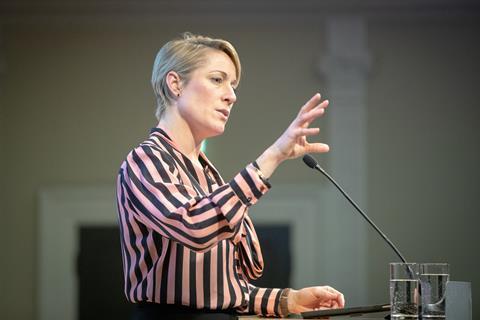The green agenda was not a topic most leaders of the real estate industry gave much thought to 20 years ago, when Julie Hirigoyen first confronted the problem.

“It was about banging on closed doors and making the case for why this is important,” says the chief executive of the UK Green Building Council (UKGBC).
“I don’t have to make that presentation anymore.”
In the past two decades, the business world has woken up to the mounting global concern about climate change – and property is no exception.
“There aren’t any organisations out there that don’t have this somewhere on their radar, or if there are, they won’t be around for very long,” says Hirigoyen.
Many investors will be even more aggressively looking at where the risks lie
In the past 12-18 months, there has been a dramatic rise in awareness of environmental issues and at the beginning of the year, a host of companies unveiled bold net zero carbon targets.
However, there is still more talk than walk on ESG and climate change, which is why Property Week has launched its The Climate Crisis Challenge in collaboration with UKGBC.
One of the key objectives is to encourage organisations to commit to a net zero carbon target, which resonates with more companies now the government has committed to achieving net zero by 2050. But this is just one of a number of targets they should be setting themselves, says Hirigoyen, and now they must also face the huge challenge posed by Covid-19. Does she think this could shift climate measures down the agenda as firms focus on survival?
“Had this happened five or 10 years ago I would’ve been very concerned,” she says. “But given the momentum in the run-up to this pandemic and the current awareness of how major risks outside our direct control can affect businesses, I don’t think it will.”
Not only does Hirigoyen think the focus on sustainability will continue post-Covid; she thinks the urgent measures taken in response to the outbreak provide the green movement with a new opportunity.
“We’ve got this scale of state intervention to stimulate a recovery from this crisis that is unprecedented in our generation and there is absolutely an ability to underpin that with clean growth, low carbon and the levelling up of ambitions.”
Compelling argument
For instance, in the residential sector, Hirigoyen thinks the economic shock makes the argument for greater energy efficiency more compelling.
“Making the bill cost lower is a no-brainer, but there’s also the issue of health. There’s evidence that homes that are cold and poorly insulated will lead to higher cost pressures on the NHS.”
On the commercial property front, much of the onus is on landlords and investors to step up to the plate and deliver greener buildings.
Assets are often being looked at for their green credentials by tenants and investors, Hirigoyen adds, with some buildings commanding a ‘green premium’ and others being hit by a ‘brown discount’, depending on their benefit or harm to the environment.
“Coming out of this, many investors will be even more aggressively looking at where the risks lie longer-term in their portfolios in relation to some of these big global seismic shifts coming our way,” says Hirigoyen.
UKGBC argues that the next 10 years is “probably the most important in terms of our climate change carbon emissions globally”.
“We have to reduce emissions by 40% to 50% within the decade if we are to stand any chance of staying within that 1.5 degree limit to the rise in global temperatures that was targeted through the COP21 Paris agreement in 2015,” says Hirigoyen.
“It requires leadership to make sure we are actively promoting low-carbon technologies, job creation, energy efficiency, green infrastructure, nature, in the stimulus packages in the post-Covid business strategy.”
In short, Covid-19 is an enormous problem, but climate change is an even bigger one that will still be there when the pandemic is over – and that people will have even greater awareness of following the pandemic.






























No comments yet